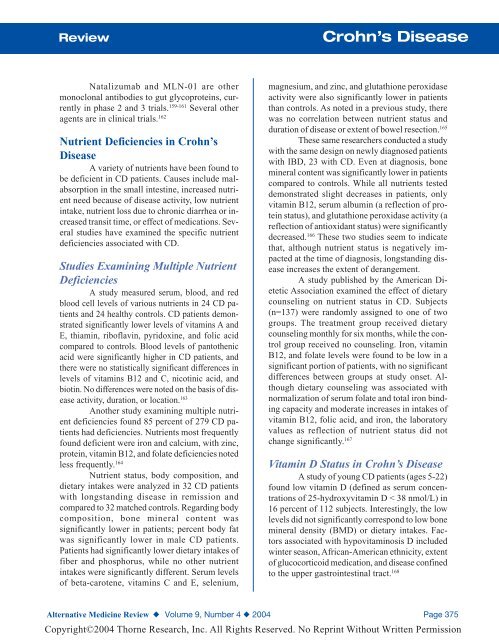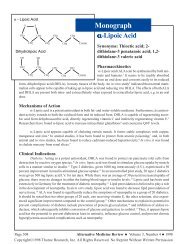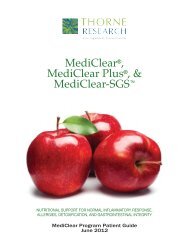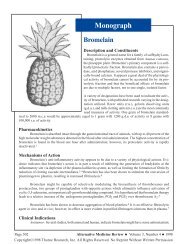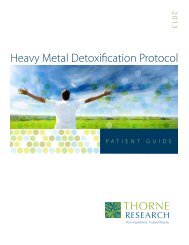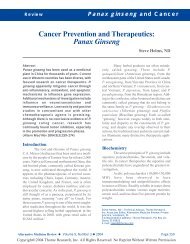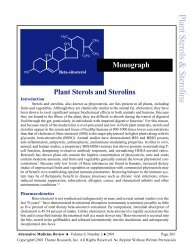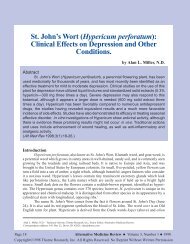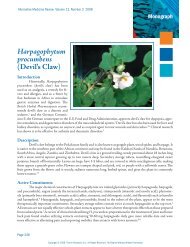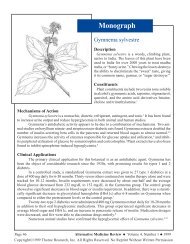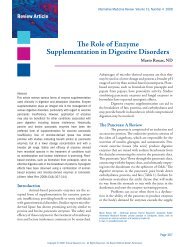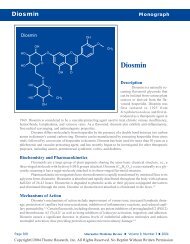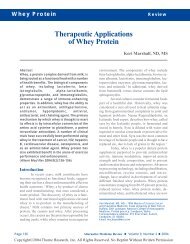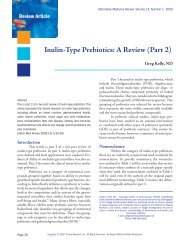Crohn's Disease - Thorne Research
Crohn's Disease - Thorne Research
Crohn's Disease - Thorne Research
You also want an ePaper? Increase the reach of your titles
YUMPU automatically turns print PDFs into web optimized ePapers that Google loves.
ReviewCrohn’s <strong>Disease</strong>Natalizumab and MLN-01 are othermonoclonal antibodies to gut glycoproteins, currentlyin phase 2 and 3 trials. 159-161 Several otheragents are in clinical trials. 162Nutrient Deficiencies in Crohn’s<strong>Disease</strong>A variety of nutrients have been found tobe deficient in CD patients. Causes include malabsorptionin the small intestine, increased nutrientneed because of disease activity, low nutrientintake, nutrient loss due to chronic diarrhea or increasedtransit time, or effect of medications. Severalstudies have examined the specific nutrientdeficiencies associated with CD.Studies Examining Multiple NutrientDeficienciesA study measured serum, blood, and redblood cell levels of various nutrients in 24 CD patientsand 24 healthy controls. CD patients demonstratedsignificantly lower levels of vitamins A andE, thiamin, riboflavin, pyridoxine, and folic acidcompared to controls. Blood levels of pantothenicacid were significantly higher in CD patients, andthere were no statistically significant differences inlevels of vitamins B12 and C, nicotinic acid, andbiotin. No differences were noted on the basis of diseaseactivity, duration, or location. 163Another study examining multiple nutrientdeficiencies found 85 percent of 279 CD patientshad deficiencies. Nutrients most frequentlyfound deficient were iron and calcium, with zinc,protein, vitamin B12, and folate deficiencies notedless frequently. 164Nutrient status, body composition, anddietary intakes were analyzed in 32 CD patientswith longstanding disease in remission andcompared to 32 matched controls. Regarding bodycomposition, bone mineral content wassignificantly lower in patients; percent body fatwas significantly lower in male CD patients.Patients had significantly lower dietary intakes offiber and phosphorus, while no other nutrientintakes were significantly different. Serum levelsof beta-carotene, vitamins C and E, selenium,magnesium, and zinc, and glutathione peroxidaseactivity were also significantly lower in patientsthan controls. As noted in a previous study, therewas no correlation between nutrient status andduration of disease or extent of bowel resection. 165These same researchers conducted a studywith the same design on newly diagnosed patientswith IBD, 23 with CD. Even at diagnosis, bonemineral content was significantly lower in patientscompared to controls. While all nutrients testeddemonstrated slight decreases in patients, onlyvitamin B12, serum albumin (a reflection of proteinstatus), and glutathione peroxidase activity (areflection of antioxidant status) were significantlydecreased. 166 These two studies seem to indicatethat, although nutrient status is negatively impactedat the time of diagnosis, longstanding diseaseincreases the extent of derangement.A study published by the American DieteticAssociation examined the effect of dietarycounseling on nutrient status in CD. Subjects(n=137) were randomly assigned to one of twogroups. The treatment group received dietarycounseling monthly for six months, while the controlgroup received no counseling. Iron, vitaminB12, and folate levels were found to be low in asignificant portion of patients, with no significantdifferences between groups at study onset. Althoughdietary counseling was associated withnormalization of serum folate and total iron bindingcapacity and moderate increases in intakes ofvitamin B12, folic acid, and iron, the laboratoryvalues as reflection of nutrient status did notchange significantly. 167Vitamin D Status in Crohn’s <strong>Disease</strong>A study of young CD patients (ages 5-22)found low vitamin D (defined as serum concentrationsof 25-hydroxyvitamin D < 38 nmol/L) in16 percent of 112 subjects. Interestingly, the lowlevels did not significantly correspond to low bonemineral density (BMD) or dietary intakes. Factorsassociated with hypovitaminosis D includedwinter season, African-American ethnicity, extentof glucocorticoid medication, and disease confinedto the upper gastrointestinal tract. 168Alternative Medicine Review ◆ Volume 9, Number 4 ◆ 2004 Page 375Copyright©2004 <strong>Thorne</strong> <strong>Research</strong>, Inc. All Rights Reserved. No Reprint Without Written Permission


